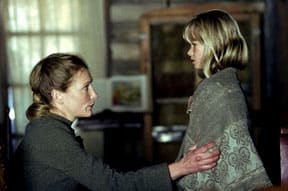Long championed by film theorists as the ultimate genre, westerns have a limited number of set-ups: the high noon showdown, the wronged cowboy, the canyon shootout. What distinguishes the films, then, is how they manipulate the details of those set-ups to arrive at something new. Unfortunately, nobody mentioned this to Ron Howard (A Beautiful Mind). In his rush to move the plot along, Howard utterly neglects the details. After a gang of nasty Indians steal her daughter, Maggie (Cate Blachett) enlists her long-lost father (Tommy Lee Jones) to help track and ultimately confront the kidnappers. As the chase moves south towards Mexico, the rescue team encounters hostile natural forces, a corrupt military unit and a vicious witch. All of these obstacles amount to little more than poorly orchestrated set pieces. Battle scenes lack basic visual logic, and so it's never clear who's shooting at whom. Laboriously crafted villains die in the blink of an eye and then are forgotten. And a valley fills with water with no build-up or explanation. Still, larger problems persist. Howard seems unable to communicate information about his story without it coming directly from someone's mouth. So where a more inventive director (like Clint Eastwood or Sergio Leone) would use a flashback or a facial expression to convey information, Howard's characters stand around and discuss their internal condition. And where Eastwood's Unforgiven took pleasure in the vernacular of the day, the "Remember all those bad things I done?" characters in The Missing all use the same grammatically correct contemporary language. This is boring. The performances are adequate, but never enough to overcome the foibles of lazy storytelling. Ron Howard must be the only credible director with the nerve to end a film with the line, "Let's go home." Here's a suggestion: stay home. (Columbia/Sony)
The Missing
Ron Howard

BY Ian MackenziePublished Dec 1, 2003